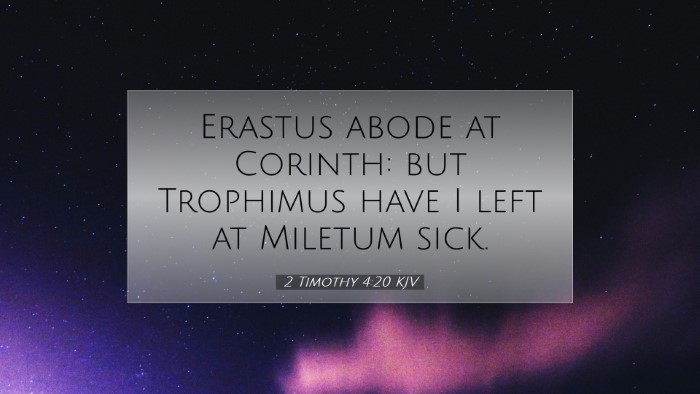Commentary on 2 Timothy 4:20
Verse: "Erastus stayed at Corinth: but Trophimus have I left at Miletum sick."
Introduction
The epistle of 2 Timothy is rich in personal notes and theological depth. In 2 Timothy 4:20, we find a poignant glimpse into Paul's ministry and the relationships he cultivated. This verse particularly highlights the circumstances surrounding two of Paul’s associates, Erastus and Trophimus. Each name carries weight in the stories of the early church and demonstrates the realities of ministry life.
Contextual Background
This letter is written by the Apostle Paul during his second imprisonment in Rome, suggesting a period of intense persecution and imminent martyrdom. Paul's concern for Timothy, his spiritual son, is palpable as he encourages him to continue the work of spreading the Gospel amidst difficulties.
Erastus
Erastus is mentioned in a few other places in the New Testament, notably in Romans 16:23 and Acts 19:22. Historically viewed as a city treasurer, his character reflects qualities of steadfastness and loyalty. His decision to remain in Corinth indicates a strategic choice to support the work there, illustrating the importance of local ministry amidst international missions.
Trophimus
Trophimus, another of Paul’s companions, represents a different reality in ministry—sickness. His situation illustrates a profound truth about the Christian experience: even faithful workers face strife and suffering. Paul’s compassionate action of leaving Trophimus sick in Miletus reveals both the limitations and the realities of Christian service.
Theological Insights
Examining this brief passage, scholars can derive several important theological insights:
- The Nature of Christian Community: The interdependence between Paul, Erastus, and Trophimus underlines the necessity of fellowship and support among believers.
- Ministry and Suffering: Trophimus’s sickness serves as a reminder that even God's servants are not immune to physical ailments, calling into question certain theologies that promise health and prosperity.
- God’s Sovereign Plan: Paul's choice to leave Trophimus was not a sign of failure, but rather an acknowledgment of God's providential timing and plan.
Commentary Excerpts
Matthew Henry
Henry notes that the mention of Erastus staying at Corinth conveys a sense of commitment to local ministry. He stresses that while Paul was focused on urgent work, he acknowledged the need for faithful men like Erastus to remain in their assigned places to continue building up the church. The decision not to travel with Paul shows a depth of understanding about the nature of ministry, which often requires workers to be 'sent' to various fields instead of always following the leader.
Albert Barnes
Barnes highlights the significance of Trophimus’s sickness, suggesting that it serves as proof that Christians may face illness and hardships as part of their lives. He emphasizes that Paul did not heal Trophimus, despite his various miracles, symbolizing the reality that divine healing is not guaranteed in every circumstance. This passage encourages believers to trust God in times of difficulty, knowing our experiences do not define God’s willingness to bless us.
Adam Clarke
Clarke adds that Paul's decision reflects his human limitations, indicating that even leaders make hard choices based on the situations they encounter. He proposes that Paul likely wanted to take Trophimus along, showing the depths of his affection. However, the necessity of leaving him, due to illness, portrays a compassionate decision that acknowledges human frailty in the context of divine mission, exemplifying a balance between urgency in ministry and sensitivity to individual needs.
Lessons for Today
The reflections found in 2 Timothy 4:20 provide timeless wisdom for pastors, students, and scholars:
- Commitment to Local Ministry: As seen with Erastus, ministry leaders must recognize and affirm the importance of those who serve locally, knowing their roles are vital for the church’s health.
- Navigating Suffering: The experience of Trophimus reassures believers that encountering illness does not equate to lacking faith or divine favor. Embracing weakness is part of our shared humanity and spiritual journey.
- God’s Plans in Human Choices: Understanding that our choices, sometimes fraught with difficulty, can still align with God’s sovereign plan gives us hope and encouragement as we navigate ministry and life.
Conclusion
2 Timothy 4:20 paints a vivid portrait of early church life and the interconnectedness of believers. The experiences of Erastus and Trophimus challenge modern practitioners of faith to view ministry through the lens of community, compassion, and the complex reality of human life. As we reflect on this passage, may we continue to seek God's guidance and strength in all ministries, recognizing the beautiful intricacies of serving God together in a world that needs His love.


